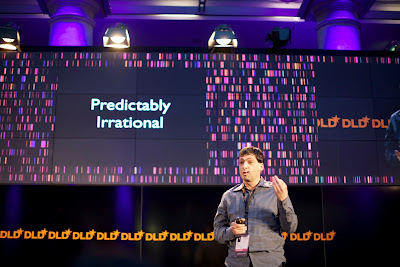 |
| Dan Airely giving a TED Talk. via Fotopedia. |
"Both specialists and intellectual privateers supplied the middle-class citizens of the age (who were still deeply attached to the notion of culture, although it had long since been robbed of its former meaning) with large numbers of lectures. Such talks were not only in the nature of festival orations for special occasions; there was a frantic trade in them, and they were given in almost incomprehensible quantities. In those days the citizen of a medium-sized town or his wife could at least once a week (in big cities pretty much every night) attend lectures offering theoretical instruction on some subject or other: on works of art, poets, scholars, researchers, world tours. The members of the audience at these lectures remained purely passive, and although some relationship between audience and content, some previous knowledge, preparation, and receptivity were tacitly assumed- in most cases nothing of the sort was present. There were entertaining, impassioned, or witty lectures on Goethe, say, in which he would be depicted descending from a post chaise wearing a blue frock-coat to seduce some Strassubrg or Wetzlar girl; or on Arabic culture; in all of them a number of fashionable phrases were shaken up like dice in a cup and everyone was delighted if he dimly recognized one or two catchwords. People heard lectures on writers whose works they had never read and never meant to, sometimes accompanied by pictures projected on a screen. At these lectures, as in the feature articles in newspapers, they struggled through a deluge of isolated cultural facts and fragments of knowledge robbed of all meaning."Given the recent backlash against TED, notably through the critiques provided by Nathan Jurgenson and Evgeny Morozov, one has to wonder if this is just a repeating cultural theme being resurrected in a new age. For Hesse, the reaction against this 'Age of the Feuilleton' produced the greatest cultural achievement of Human intellect- the Glass Bead Game. While utopian, one hopes that Hesse's narrative development has similar resonance in our own TED-happy age.
